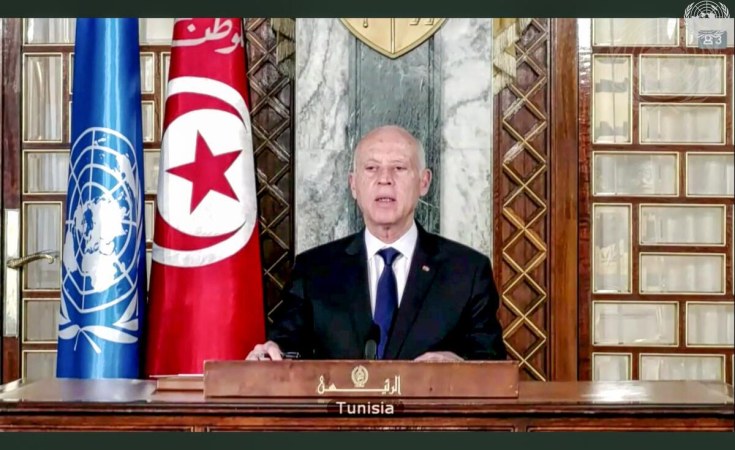Clampdown Stifles Diverse Voices, Political Debate
When veteran journalist Elyes Gharbi announced on June 28 that he was leaving the "Midi Show" on Tunisia's leading radio station, Mosaïque FM, after nine years, he did not explain why. However, Gharbi's decision came just months after he acknowledged "unbelievable threats" against journalism in the country and a year after police investigated him for comments made on the show.
As Tunisia gears up for its first presidential election since President Kais Saied's 2021 power grab, authorities are stifling dissent, especially in the media. Human Rights Watch found that at least five media professionals are currently behind bars for their work or opinions. According to the National Syndicate of Tunisian Journalists (Syndicat National des Journalistes Tunisiens, SNJT), at least 39 cases have been brought against journalists for their work since May 2023, including under the repressive decree-law 2022-54 on Cybercrime and the 2015 counterterrorism law.
In May and July 2024, prominent journalists Borhen Bsaies and Mourad Zeghidi, as well as lawyer and pundit Sonia Dahmani, were sentenced to one year in prison under the cybercrime law. At the end of July, a Tunis court of appeals reduced Bsaies and Zeghidi's sentences to eight months in prison. Last year, Noureddine Boutar, director of Mosaïque FM, was detained for three months and accused of "money laundering," "conspiracy," and "terrorism," including for alleged incitement against President Saied. Police also recently questioned executives of other private broadcasters as well as the independent outlet Nawaat.
This clampdown is gradually wiping out criticism and diversity of opinion from Tunisia's media landscape. Political debate has almost disappeared from the airwaves. Private radio IFM and Carthage+ TV channel have suspended their most popular shows that had featured the imprisoned Dahmani, Bsaies, and Zeghidi, as well as IFM's "90 minutes," whose host, Khouloud Mabrouk, was questioned by police about her journalism in April. Mabrouk said the show's premature end was partly due to "pressure."
Public media journalists have been fighting against censorship and to safeguard their public service mission since President Saied started purging their leadership in 2021. His government appointed new leadership, including to Tunis Afrique Press (TAP), the Tunisian national news agency, who have sometimes revived old authoritarian habits. For example, according to the SNJT, TAP's CEO Najeh Missaoui on July 4 ordered a widely picked-up dispatch about a new presidential candidate be deleted.
President Saied owes much to Tunisia's free press: he was himself elected after participating in the first-ever televised presidential debates in 2019. It is now his responsibility to ensure media freedoms and the free flow of information ahead of the October 6 election.
Bassam Khawaja, Deputy Director, Middle East and North Africa Division


